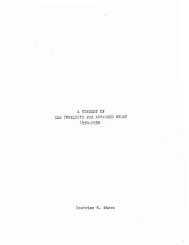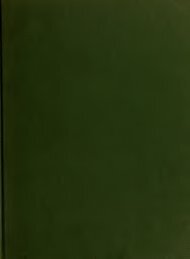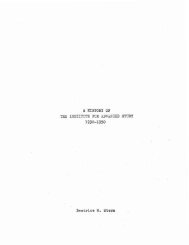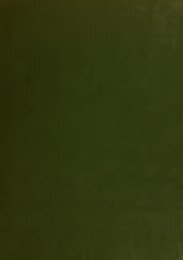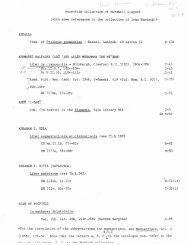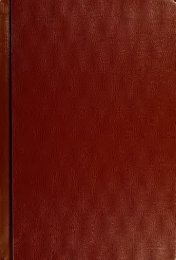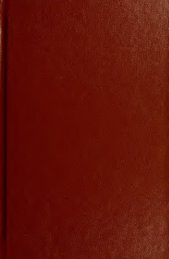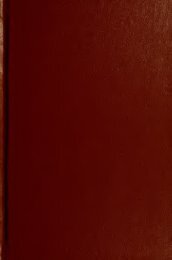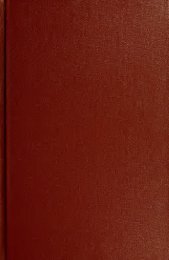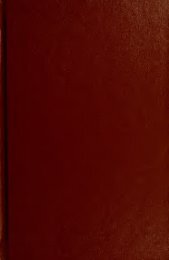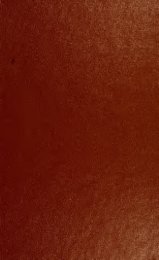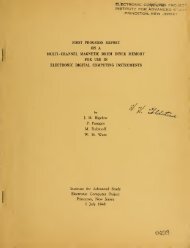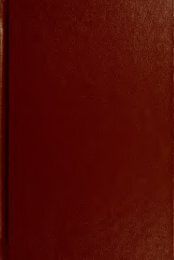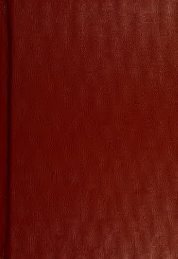Publications of members, 1930-1954. - Libraries - Institute for ...
Publications of members, 1930-1954. - Libraries - Institute for ...
Publications of members, 1930-1954. - Libraries - Institute for ...
Create successful ePaper yourself
Turn your PDF publications into a flip-book with our unique Google optimized e-Paper software.
matical physics. A little later, appointments were made in various fields <strong>of</strong> archaeo-<br />
logical and historical study, and in economics. These initial appointments, like the<br />
Faculty appointments to be made later, helped to define, though they did not limit, the<br />
fields <strong>of</strong> study at the <strong>Institute</strong>. On the one hand, the inevitable and desirable limita-<br />
tion on the size <strong>of</strong> the Faculty, and the importance <strong>of</strong> some partial community <strong>of</strong> in-<br />
terest among its <strong>members</strong>, have clearly <strong>for</strong>eclosed the possibility <strong>of</strong> representing all<br />
academic disciplines. On the other hand, although we have no policy <strong>of</strong> excluding mem-<br />
bers whose interests are remote from those <strong>of</strong> any member <strong>of</strong> the Faculty, we tend to<br />
support with special emphasis fields in which we have some tradition <strong>of</strong> fruitful<br />
activity.<br />
The <strong>Institute</strong> has until now sought to work without experimental facilities. In part<br />
this is because the <strong>Institute</strong>'s limited funds could not adequately support such facilities;<br />
but it is also a natural consequence <strong>of</strong> an emphasis on, and solicitude <strong>for</strong>, temporary<br />
<strong>members</strong>, who manifestly cannot by themselves make feasible the operation <strong>of</strong> experi-<br />
mental programs. We have made one exception to this policy, and that a modest one,<br />
in maintaining—with the support <strong>of</strong> the Government—an electronic computer project<br />
devoted both to the logical and mathematical problems <strong>of</strong> high-speed computing, and<br />
to some <strong>of</strong> its practical applications.<br />
At present the academic work <strong>of</strong> the <strong>Institute</strong> is carried on in two schools: a School <strong>of</strong><br />
Mathematics and a School <strong>of</strong> Historical Studies. The <strong>members</strong> <strong>of</strong> the School <strong>of</strong> Mathe-<br />
matics are <strong>for</strong> the most part pure mathematicians and theoretical physicists; but there<br />
have been <strong>members</strong> who have worked in other sciences—chemistry, biology, psychol-<br />
ogy, astronomy, <strong>for</strong> example. The School <strong>of</strong> Historical Studies is perhaps broader still<br />
in scope, and includes in principle all learning <strong>for</strong> which the use <strong>of</strong> the historical method<br />
is a principal instrument. Here, too, our work tends to reflect the interests <strong>of</strong> the<br />
Faculty: Greek archaeology and epigraphy, Greek philosophy and philology, palaeog-<br />
raphy, mediaeval history and the history <strong>of</strong> art, modern history, politics and economics,<br />
the history <strong>of</strong> mathematics and the sciences. Here again there have been <strong>members</strong>,<br />
working alone or in concert, in disciplines not represented on the Faculty.<br />
In these two schools, the <strong>Institute</strong> has some thirty permanent <strong>members</strong>, or mem-<br />
bers with appointments <strong>of</strong> long term. Among the permanent <strong>members</strong>, there are<br />
about fifteen who constitute the present Faculty.<br />
A principal function <strong>of</strong> the <strong>Institute</strong> is to provide <strong>for</strong> <strong>members</strong> who come here <strong>for</strong><br />
short periods, <strong>for</strong> a term or a year or two years. There are currently some hundred such<br />
<strong>members</strong> in residence. The <strong>Institute</strong> has always welcomed scholars from abroad and,<br />
in so far as possible, has tried to open its doors to qualified <strong>members</strong> from all parts<br />
<strong>of</strong> the world. More than half <strong>of</strong> our <strong>members</strong> come to us from Europe or from Asia.<br />
[4]



